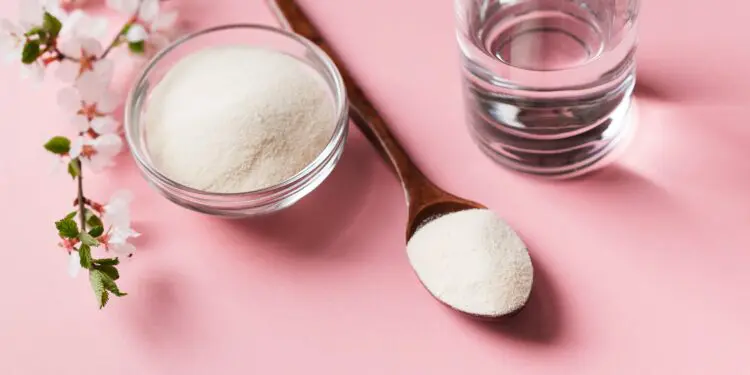Health, beauty and well-being are more popular topics than ever. Fuelled by an uptick in social-media influencers, mega celebrity brands from Goop to Fenty Beauty to Kylie Cosmetics, and a proliferation of information and research, the market is bigger than ever. Unfortunately, there are downsides to any given situation, and in this case, ‘miracle products’ and quick-fixes that tend to over-promise and under-deliver are common. It is undeniable that the popularity of collagen supplements has increased markedly recently, with reservations about their effectiveness in some quarters based on a perceived lack of peer-reviewed data. In order to offset some reservations about a product we wholeheartedly recommend, we’ve collated some of our most recent research below.
What is collagen?
Put briefly, collagen is one of the most prominent and important proteins in the human body. With a wide range of functions, from the strength, hydration and elasticity of the skin, to maintaining bone density, to joint health, the natural decline of collagen production over time is an age-related issue that unfortunately affects us all.
What is hydrolysed marine collagen?
One of the difficulties, when it comes to the supplementation of collagen, is the matter of absorption. The molecular make up of collagen in its natural form is relatively large, and quite complicated, effectively three braided chains of amino acids in a triple helix formation. This means that collagen needs to be somewhat broken down before it becomes useful. This is where hydrolysis comes in, the process of introducing water molecules as a means of breaking down large molecules into several smaller ones. This results in a hydrolysed compound, sometimes referred to as a hydrolysate, and for this reason you will often see collagen products described as hydrolysed.
The other element that is important to consider when deciding on a collagen product is the source. It is important to note that as of yet, despite attempts to create a vegetarian or vegan friendly product, there is no effective animal-free source of collagen. Generally speaking collagen products are split into either bovine, (sourced from cow by-products) or marine (made from fish and certain invertebrates such as jellyfish) and, while both have their benefits, we would recommend ethical marine collagen above all, as it tends to be more sustainably sourced and ethically produced.
What effect does collagen supplementation have?
Along with the skin, collagen is also key component in bones, muscles and other body parts, responsible for everything from healthy cartilage to forming a protective layer around the organs. As the body’s largest – certainly it’s most visible – organ, the effect of collagen on the skin is huge. Type 1 and Type 3 collagen, two of the three most prominent types, of which 28 have currently been identified, are closely related to the healthy appearance, hydration and elasticity of your skin. It is this loss of hydration and structure in the skin cells over time which leads to the appearance of fine lines, wrinkles, sagging and hollowing and counteracting this, in turn, is one of the main benefits of boosting collagen levels.
Studies have suggested several other benefits of increasing and maintaining collagen levels in the body, including:
- Thicker, healthier hair and nails
- Mild relief for osteoarthritis pain
- Increased muscles mass
- Improved heart health
While some of these benefits are more common than others, skin health for example, there is good scientific evidence for all of them, underlining the potential importance of collagen to a healthy lifestyle.
What are the main causes of collagen deficiency?
The good news when it comes to causes of collagen deficiency, is that many of them are lifestyle-related, meaning that it is possible to reduce the rate of decline without having to resort to drastic or medical measures. Some of the more prominent causative factors when dealing with a collagen deficiency are as follows:
- Stress – one of the body’s natural defences against stress is the hormone cortisol, which helps to calm the body and lower adrenaline. One of the many unfortunate side effects of high stress levels, however, is that the subsequent high levels of cortisol in turn activate enzymes in the skin that break down collagen.
- Vitamins and Minerals – like so many of the body’s healthy functions, vitamins and minerals play a huge part in collagen production. Pay particular attention to regular sources of Vitamin C, Zinc and Copper, all of which help to generate and convert new collagen.
- Antioxidants – put simply, antioxidants are extremely important in protecting cells throughout the body, including collagen. Anthocyanins, a type of antioxidant found in red and purple foods, certain fruits and berries for example, are particularly useful in collagen production and protection.
- Lifestyle – several factors that contribute to collagen decline are related closely to lifestyle choices. Drug intake (including alcohol), smoking, poor diet, high sugar intake and lack of sleep are all things which increase inflammation and oxidative stress, thereby having a negative effect on the production and maintenance of collagen levels in the body.
- UV Light – ultraviolet light, specifically UVA light which can be found in several sources from sunlight, to tanning lamps, to some LED lighting, is capable of penetrating the dermal layer of the skin and breaking down collagen, if sufficient protection is not taken.
- Genetics – unfortunately, as with everything health related, our genetic makeup also plays a part, meaning that some people are predisposed to deficiencies, collagen vascular diseases such as lupus, or inflammation, all of which have a decidedly negative effect on collagen levels.
Does collagen have anti-ageing effects on the body?
While we’re happy to present the findings from our research, you don’t need to simply take our word for it, as the scientific community devotes more time and resources to the topic, more and more studies such as one from Dermatology Practical and Conceptual journal, will become available. In short while collagen is not a miracle product (unfortunately there’s no such thing) it is absolutely a product with proven results when it comes to anti-ageing benefits.








